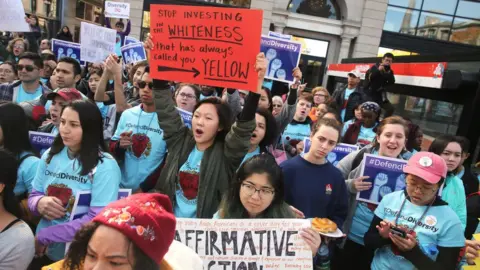Harvard University cleared of racial bias in admissions process
 Getty Images
Getty ImagesHarvard University's admissions office does not discriminate against Asian-American applicants, a federal court has ruled in a long-awaited decision.
The judge rejected the claim that white, black and Hispanic applicants were given preference over Asian counterparts with similar grades.
District Judge Allison D. Burroughs said the court would not dismantle a "very fine" admissions program.
The trial has been seen as a referendum on affirmative action hiring practices.
An appeal of the ruling could still reach the US Supreme Court.
Harvard is one of the top-rated and most selective universities in the US, admitting about 1,600 freshman students out of 42,000 applicants each year.
What was Harvard accused of?
The lawsuit was brought by a group called Students For Fair Admissions (SFFA).
It was formed by conservative activist Edward Blum, who opposes affirmative action - the proactive effort to include minorities that have been historically marginalised due to discrimination.
It claims that the elite university unfairly weighs race when considering an applicant, forcing Asian-Americans to meet a higher bar in order to be accepted.
It says Harvard uses a quota system or a system of "racial balancing" - practices that are illegal under federal law - to limit the number of Asian students on campus in an effort to maintain space for other racial groups.
The plaintiffs say that if race was not considered, and if admissions were only based on grades alone, twice as many Asian pupils would be admitted because they perform well academically.
How did Harvard respond?
Harvard says it uses a "holistic" strategy to evaluate students, and that race is only one minor consideration.
The institution points out that its population of Asians students has been growing, and now stands at 23% of the student body.
Other Ivy league universities and the American Civil Liberties Union (ACLU) have supported Harvard in the case.
What was the ruling?
"The court will not dismantle a very fine admissions program that passes constitutional muster, solely because it could do better," US District Judge Allison Burroughs in Boston wrote in a decision released on Tuesday.
The decision came nearly a year after a trial which did not include a jury.
The SFFA is expected to appeal the decision, meaning the case could likely end up in the Supreme Court.